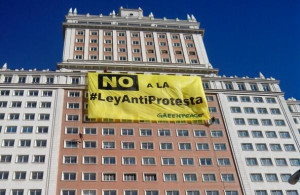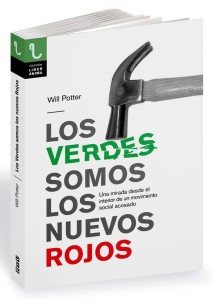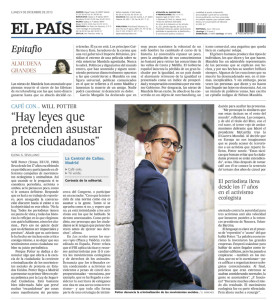 This article was originally published in Spanish by El Huffington Post (Spain).Â
This article was originally published in Spanish by El Huffington Post (Spain).Â
The newly approved “Ley de Seguridad Ciudadana” (Public Safety Act) may include provisions about drugs and sporting events, but make no mistake: this law is not about protecting the public, it is about criminalizing protest, and restricting your right to speak out.
I recently visited Madrid and Barcelona for the release of the Spanish translation of my book, Green Is the New Red. My work focuses on how political activism is being criminalized. Given my area of work, and living in the United States, it is rare that I am shocked anymore by new “national security” laws or repressive measures. I see them every day.Â
But the “Ley de Seguridad Ciudadana” represents a dangerous expansion of how the freedom to protest is being silenced.
For example, serious offenses include:
* Climbing a public building as a protest action (such as Greenpeace has done in recent months)
* Jumping into a bullring to protest
*Wearing a hood or anything that hinders law enforcement identification at protests
 All of these are punishable by a fine between 1,001 to 30,000 euros.
All of these are punishable by a fine between 1,001 to 30,000 euros.
Other “minor” offenses include placing a tent in a public space, as the Occupy movement has done, taking photographs of police, or failing to follow a permitted march route. These and other violations are punishable with a fine up to 1,000 euros.
I have extensively documented the mechanisms that have allowed this to take place in the United States, and they are identical to what is happening right now in Spain.
For example, the environmental movement in the United States has been using non-violent civil disobedience to stop the construction of the Keystone XL pipeline. Activists have been blockaded roads and locking themselves to equipment. As a result, they are now facing increased time in jail. In some cases, this is directly at the request of corporations: In one recent instance, I reported about how TransCanada is instructing police how to prosecute protesters.
In another case, a university student named Tim DeChristopher disrupted a government auction where public lands were being sold to corporations. Tim raised his hand to purchase this land, even though he knew he did not have any money. The government auction was later ruled illegal, but Tim was sentenced to two years in prison.
Now in the United States there is a radical expansion of this criminalization. Some states have passed new laws that specifically target protesters who take photographs or video of factory farms and slaughterhouses. Some politicians have called these investigators “terrorists.” Just a few weeks ago, an undercover investigator who exposed animal cruelty at a farm — and the video led to criminal prosecutions — was charged with animal cruelty herself. To say that filming animal cruelty is the same as causing animal cruelty is much like saying this new Spanish law is meant to protect citizens; it would make George Orwell proud.
We are already seeing an expansion of these U.S. tactics to other countries. In Australia, corporations are asking for new laws against photography that are the exact same as the United States.
In Spain, a group of activists affiliated with Igualdad Animal are in the middle of criminal proceedings as well. When they were arrested, they were immediately labeled as “terrorists” and threats to the public safety. The government has vaguely accused them of being associated with the release of mink from fur farms, but this absurd; these political activists are being targeted because they have been incredible effective at protesting powerful industries and exposing to the public what is happening.
Regardless of how you feel about animal rights, these activists deserve your full support. What I have witnessed firsthand in the United States is that when people are singled out for persecution because of their political beliefs, the government never stops with them. It expands to other social movements as well, and puts all of our freedoms at risk. This is precisely what we are witnessing with the Ley de Seguridad Ciudadana. 
You may be saying to yourself, “Well I do not climb public buildings, and I don’t even go to protests. Why should I be concerned?”
The biggest danger of this legislation is not that everyone protesting will end up in prison, or facing fines. The real danger is what in the United States we call a “chilling effect.”Â
This law does not outlaw all protect, but it “chills” it. It makes people afraid of speaking up and protesting. It makes people wonder if they will face arrest or fines for their actions.Â
Most importantly, laws like this are about fear. They are meant to make us afraid to use our rights.
For many years in the United States, this repression caused widespread fear. But now that is changing. People are outraged about these attacks on democracy, and more people are becoming active. I hope this repressive law in Spain has the same results — instead of instilling fear, it should inspire anger and motivate the public to defend their freedoms.